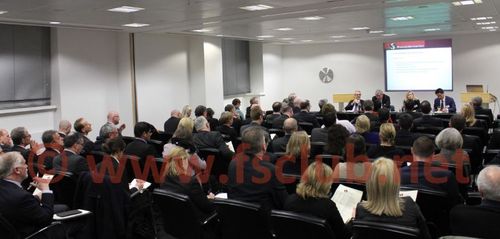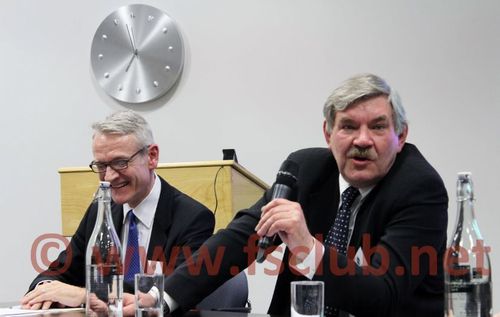
We had our annual debate about SEPA for the fourth year
running the other day.
This time:
- Jerome Traisnel, Slimpay;
- Ruth Wandhöfer, Global Head of Regulatory & Market Strategy, Citi Transaction Services; and
- Tino Kam, SEPA Executive, Global Cash
Management, the Royal Bank of Scotland
were opposed by:
- Simon Bailey, Director, CGI; and
- Peter Miller, Managing Director, Blacksmith
Consulting

Jerome Traisnel* provided
some stirring words to open the session.
Jerome pointed out that SEPA is a very challenging project
but that the banking community is now ready, fit and able to make it succeed.
If it succeeds, it will become the first transnational ACH
with uniform payment tools compliant with ISO, with the additional benefit to
be ideally positioned to participate in further extensions of transfrontier
payments in the future.
The Eurozone SEPA deadline of February 2014 is a constraint,
with the risk to have comments on the capabilities or non-capabilities of
European nations to match such a requirement. However, it is obvious from activities, or
lack of activities to date, that the market needs such a target in order to get
movement from the corporate community.
The SEPA end dates will not be renegotiated, and the European
parliament has not even had such a discussion.
Maybe the target dates will not be matched in several European
countries, but the transition has already started and it will increase
steadily.
In France, all major corporations (utilities, telecom, insurers)
have a migration plan and plan to match the deadline. The major boost to this
is the abandonment of the multilateral interchange fees (MIF) on direct debits
in France from September 1st 2013. Major corporations represent more than half of
SEPA direct debit (SDD) volumes as a result, with the reduction in MIF saving
about €200 million in France alone.
SEPA also brings opportunities, such as the electronic
signature of an SDD mandate. The PSD articles 54 and 66 transposed in all
European countries in late 2009 states that a direct debit shall be executed on
the basis of a formal payer's consent. SDD
therefore brings an innovative way to record the payer's consent.
SEPA is on the way, whatever the comments on the transition
speed. The most important thing to note is that European countries, despite
difficult economic conditions, still have the courage to revamp their payment
schemes and follow this course.
Ruth Wandhöfer further
reinforced these claims by asking: what is the alternative? What is the alternative to SEPA? What is the alternative to the European Union
and Eurozone today?
To go back to domestic markets? To go back to a fragmented Europe?
That will not work, as it is too late for fragmentation.
Things have gone too far and too much integration and consolidation has taken
place.
We have a PEACH (Pan-European ACH) and more, and going back
to localised markets with fragmentation would just create issues.
In fact, if you look at today’s marketplace, a European
Union that divided would create war.
That may appear extreme but just look at Greece, Spain, Italy and the
issues of austerity measures, cuts and budgetary extremes. Any breakup of Europe would just make these extremes
worse and cause riots within countries, frictions between countries and territorial
extremes across countries and across Europe.
That is the crux of today’s debate and it is not about SEPA but
about the fundamentals of keeping Europe together and the Eurozone and SEPA is helping
to achieve just that.

Proposers Tino Kam and Ruth Wandhöfer
Simon Bailey opposed
Jerome and Ruth’s position by comparing the SEPA Project with the American
Space Program of the 1960s.
Both projects have involved billions of investment over a
ten year cycle involving many constituencies but, if America had reached the
Moon, SEPA has landed somewhere around Cleethorpes (this got a big laugh).
For example, the original aim of SEPA was to increase trade
and make billions of savings on the cost of our annual GDP in the Eurozone and
European Union. Has it achieved
that? No. If anything, Europe is more of a basket case
today than it was a decade ago.
Is there interoperability of payments systems across Europe
a decade after the project started? No. The drive is there and the banks are creating
this capability, but it is very slow and the reality is that it is still a long
way away. Even with the end dates, most
corporates won’t be ready or willing or able to use interoperability, as demonstrated
by the surveys recently produced that show over half of corporates – in most
cases, around two-thirds – have no idea what SEPA is.
Then there is the regulation and implementation of SEPA
which, according to the PSD will be overseen by the relevant competent authority. That is a joke when many of the member states
of the European Union have several authorities, not just one.
In summary, it seems that we are still doing the classic mistake
of building grand plans with moderate to poor delivery, and then making declarations
of success.
Tino Kam took
this criticism on the chin and said that, on the question “does it matter”, the
answer has to be a big YES.
Apart from implementing a ‘Single Euro Payment Area’,
corporates will obviously benefit due to further standardisation, harmonisation
and therefore improved efficiencies.
SEPA will also be the foundation and an enabler for the next
Payment and Collection Factory solutions such as improved reconciliation and
Straight Through Reporting, centralised A/R and supporting In-house Banking
Solutions through On behalf Payments and Collections.
The second part of the question, “Is SEPA happening?” I
would like to address in two separate questions:
Firstly: “Do we complete the SEPA migration by February
2014?”
For this, I believe that the answer will be NO, especially
considering the current state we are in, as confirmed by the many surveys
supporting that view. A significant number of the Euro SEPA Credit Transfer
(SCT) and SDD flows will not be migrated in time. This will also be due in part
to the regulation itself, with its clauses for niche products and waivers.
Secondly “Are we
ready by February 2014” and, on that one, I say YES!
Consumers will be ready. Sure we need to get used to IBAN, but we will
be able to manage that change.
Will all Corporates be ready?
No.
We see that even the big multi-nationals with large SEPA
projects are not sure if they can migrate all their flows on time, and for that
do need a 'Plan B'. Corporates will need support from their vendors, and then banks.
Banks are ready and will support their clients to make it happen and ensure
that the payment and collection flows will be converted to SEPA, or that in-country
Clearing and Settlement Mechanisms (CSMs) will continue to support some of the
legacy flows.

Opposers Simon Bailey and Peter Miller
Peter Miller decided
to take a different tack in opposing the motion, saying that the answer to the
question is yes in both cases.
Is SEPA happening?
Yes.
The more important question is whether it was the right idea
in the first place.
Whether it is or not, it is happening and must conclude, as
the law requires it, whatever the medium- to longer- term benefits may be. The PSD and the end-state regulations are in
place, whether we like them or not and most of the banks are ready for it, and
have been for some time.
But what about the customers?
Does it matter?
It matters right now for the negative reason that potential
failure of or blockages within the payment systems would be economically
damaging for all European countries, and not just the Eurozone. Therefore, right now, the positive reasons
for claiming that SEPA matters are outweighed by the need for the project to
succeed.
The evening then opened to questions from the floor and
further debate and discussion, concluding with a vote at the end of the
evening ...

... which overwhelmingly carried the motion by around 75% of the House
supporting the statement: “This House Believes That SEPA Does Matter”.
Concerningly, the statement “This House Believes That SEPA
Is Happening” was then opposed by a similar number – around 80% of the audience.
This may be slightly related to some Euro scepticism coming
from the mainly British audience, but the core view appeared to be that the answers
to the questions are the same, whatever your underlying view of European
politics may be.
This was best summarised by Peter Miller who, wrapping up
his perspectives of the event on an email the next day, said that it shouldn’t
be forgotten that a project which works across twenty three countries (the
“ins”, the accession countries and the “outs”) processing about 200 million
transactions per day ( in the “ins” and the accession countries), replacing the
tightly encoded heritage data structures with large gobs of XML data needs more
of the participants and the authorities to worry harder about the project risk,
however tempting it is at this point to push the merits of the initiative.
It will not make the savings at the clearing and settlement
level originally envisaged. There will
not be two or three interoperable PEACHs.
Indeed, you might argue that the very idea of this creates a
concentration risk across the whole economic area which the EPC should have
spotted.
The last 5-10% of the market is going to be hard to
shift. History tells us so.
The corporate sector and the agency banking sectors would be
on red alert today on any normal project monitoring tool.
Delay will mean that banks and clearings will need to
continue to offer heritage products in parallel with the SEPA ones, and thus
leave banks unable to claim some of the cost benefits, and the lack of a
program owner, an authority which is really on the hook for delivery with the
power to influence its success, should worry everyone.
We are in the late implementation phase of the project, in
which risks need to be closely managed and some degree of delay/overrun feels
inevitable. We must hope that it is
possible to declare some sort of success, for fear that failure to reach
objectives will be regarded as yet another stick used by the authorities to
beat the banks up with.
The answers to the questions are the same irrespective of
whether you were a believer in the first place and irrespective of what you
think of the governance of the euro currency as a whole.
So perhaps it is time to change the question. Perhaps the question should be: “If SEPA is a
success, where do we go from February 2014?” or, more interestingly: “What
should PSD2 look like. Do we need one?”
Speaking of such things, here are the results of our annual
SEPA debate:
- 2010: This House Believed That SEPA DOES Matter (Just)
- 2011: This House Believed That SEPA Does NOT Matter
- 2012: This House Believed That SEPA DOES Matter (two-thirds) BUT It Is NOT
Happening (99%) - 2013: This House Believed That SEPA DOES Matter (three-quarters) BUT It Is NOT
Happening (80%)
Combine these results with our European Payments Survey, also
in its fourth year:
- 2012: SEPA will survive even if the Euro doesn’t, according
to banking industry - 2011: 2011 Survey on the Health of European Payments
- 2010: PSD and SEPA research results 2010
- 2009: PSD and SEPA research results
And you can see the pulse of the SEPA view from here in
London and across Europe.
Speaking of these things, we are about to repeat our annual
SEPA survey. If you would like to
participate, please email admin@balatroltd.com.
* Jerome could not actually attend in person due to inclement weather in Paris, leaving Britain as an island in Europe as usual.
Chris M Skinner
Chris Skinner is best known as an independent commentator on the financial markets through his blog, TheFinanser.com, as author of the bestselling book Digital Bank, and Chair of the European networking forum the Financial Services Club. He has been voted one of the most influential people in banking by The Financial Brand (as well as one of the best blogs), a FinTech Titan (Next Bank), one of the Fintech Leaders you need to follow (City AM, Deluxe and Jax Finance), as well as one of the Top 40 most influential people in financial technology by the Wall Street Journal's Financial News. To learn more click here...






















